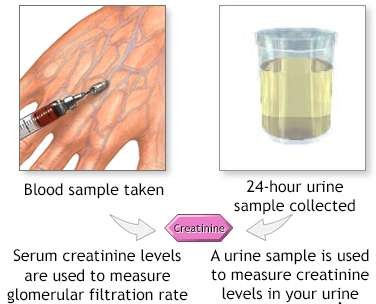A nurse is caring for a client who will have blood sampling for serum creatinine level and asks what this test shows. Which of the following responses should the nurse make?
"This test will tell your doctor how your kidneys are functioning."
"This test will tell if you have severe renal impairment or a disease."
"We'll find out if any medications, such as steroids, are interfering with your kidney function."
"You'll have to ask your doctor."
The Correct Answer is A
Choice A reason: The serum creatinine test measures the amount of creatinine in the blood and provides information about kidney function. Normal ranges for serum creatinine levels are 0.74 to 1.35 mg/dL for adult men and 0.59 to
1.04 mg/dL for adult women. This test is a common way to assess renal function and can indicate if the kidneys are not filtering waste effectively.
Choice B reason: While a serum creatinine test can indicate severe renal impairment, it does not diagnose a specific disease. Further testing would be required to determine the presence of a particular renal disease.
Choice C reason: The serum creatinine test does not directly show if medications are affecting kidney function. However, if a patient is on medications known to affect the kidneys, such as certain steroids, changes in creatinine levels can suggest an impact on renal function.
Choice D reason: It is part of the nurse's role to provide information about tests and procedures. Telling a patient to ask the doctor does not offer immediate support or information, which can be important for patient care and understanding.

Nursing Test Bank
Naxlex Comprehensive Predictor Exams
Related Questions
Correct Answer is C
Explanation
Choice A reason: Air embolism is a potential complication during hemodialysis, but it would likely present with more acute symptoms such as chest pain or difficulty breathing.
Choice B reason: Septicemia would typically present with fever and hypotension, not necessarily with headache, nausea, and restlessness.
Choice C reason: Dialysis disequilibrium syndrome can occur after hemodialysis, especially after the first treatment, and is characterized by symptoms such as headache, nausea, and restlessness.
Choice D reason: Peritonitis is a complication associated with peritoneal dialysis, not hemodialysis.
Correct Answer is C
Explanation
Choice A reason: pH 7.30 with elevated HCO3- and PaCO2 suggests compensated respiratory acidosis, not typical for chronic kidney disease.
Choice B reason: pH 7.55 with elevated HCO3- and low PaCO2 suggests metabolic alkalosis, which is not typical for chronic kidney disease.
Choice C reason: pH 7.25 with decreased HCO3- and PaCO2 suggests metabolic acidosis, which is expected in chronic kidney disease due to the accumulation of acids.
Choice D reason: pH 7.50 with low HCO3- and PaCO2 suggests compensated metabolic alkalosis, which is not typical for chronic kidney disease.
Whether you are a student looking to ace your exams or a practicing nurse seeking to enhance your expertise , our nursing education contents will empower you with the confidence and competence to make a difference in the lives of patients and become a respected leader in the healthcare field.
Visit Naxlex, invest in your future and unlock endless possibilities with our unparalleled nursing education contents today
Report Wrong Answer on the Current Question
Do you disagree with the answer? If yes, what is your expected answer? Explain.
Kindly be descriptive with the issue you are facing.
